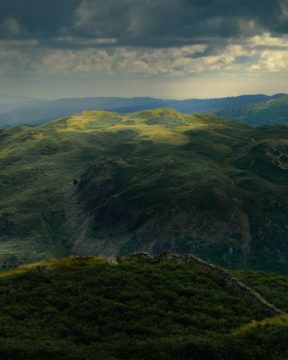by Chris Horner
Deprivation is for me what daffodils were for Wordsworth –Philip Larkin
Wordsworth as the poet of loss and lack

William Wordsworth’s poetry can seem all too familiar, what with all that wandering lonely as a cloud. But he is stranger than we often remember him. Take this, for example:
Twilight was coming on, yet through the gloom
I saw distinctly on the opposite shore,
Beneath a tree and close by the lake side,
A heap of garments, as if left by one
Who there was bathing. Half an hour I watched
And no one owned them; meanwhile the calm lake
Grew dark with all the shadows on its breast,
And now and then a leaping fish disturbed
The breathless stillness. The succeeding day
There came a company, and in their boat
Sounded with iron hooks and with long poles.
At length the dead man, mid that beauteous scene
Of trees and hills and water, bolt upright
Rose with his ghastly face.
(The Prelude, ll 266-279, first part, 1799 version)
He is describing an event from when he was eight years old. A teacher from a nearby school had drowned – this was the recovery of the body. Why is he recalling this? We might say that the sheer vivid gruesomeness of the event just stuck in his mind. Surely there is something in that – one might be haunted by a memory like that, it might appear in one’s nightmares. Yet the scene occurs as one of the ‘spots of time’ that Wordsworth presents to us as remembered experiences that act on him in a way that refreshes and restores him. It is somehow acting on his psyche in a positive way.
Wordsworth continues, in some famous lines:
I might advert
To numerous accidents in flood or field,
Quarry or moor, or mid the winter snows,
Distresses and disasters, tragic facts
Of rural history that impressed my mind
With images to which in following years
Far other feelings were attached — with forms
That yet exist with independent life,
And, like their archetypes, know no decay.
There are in our existence spots of time
Which with distinct preeminence retain
A fructifying virtue, whence, depressed
By trivial occupations and the round
Of ordinary intercourse, our minds —
Especially the imaginative power —
Are nourished and invisibly repaired.
Such moments chiefly seem to have their date
In our first childhood.
(ll 279-296)
Why should ‘tragic facts’ have this ‘fructifying’ effect on him? The spots of time he describes in The Prelude tend towards what one might have expected to be the traumatic. There is the famous account of his terrifying experience (again, as a child) of the mountains seeming to rear up and move when he steals a boat, and there is the intense and strange scene he recalls, waiting to to be taken home from school with the ‘The single sheep, and the one blasted tree/And the bleak music of that old stone wall,/ the noise of wood and water..’. A few days later his father died. The scene and the event are somehow fused.
What is going on here? Wordsworth biographer and critic Jonathan Bate suggests that this is what Freud would have called a ‘screen memory’: a memory of something that is not itself the traumatic event itself but something associated with that image, a way of evading – yet somehow evoking – confrontation with the traumatic thing itself.[1] An unconscious memory lies somehow concealed behind the more quotidian, yet intensely recalled scene, in this case, the loss of his father. I think this is right, but not the whole story. He was, as Bate notes, ‘much possessed by death’. Very strikingly, Wordsworth recounts the time when one on one of his first horseback rides as a child, he loses his way and comes across a place where an old gibbet had stood, where a wife murderer had hung long before. All that remained was a ridge of turf that resembled a grave. Then he sees a ‘naked pool’ and stone signal beacon on a hill. And then:
A girl who bore a pitcher on her head
And seemed with difficult steps to force her way
Against the blowing wind. It was in truth
An ordinary sight, but I should need
Colours and words that are unknown to man
To paint the visionary dreariness
Which, while I looked all round for my lost guide,
Did at that time invest the naked pool,
The beacon on the lonely eminence,
The woman and her garments vexed and tossed
By the strong wind. (ll 317-326)
‘Visionary dreariness’ ! These are indeed intensely remembered experiences. Somehow death haunted, they partake of the sublime: the complex psychic reaction to the large, the dark, the strange and unfathomable in life, in nature, the uncanny. The sublime both emphasises our smallness in the face of the vast, yet somehow also provides a kind of pain that we enjoy, that seems to provide a kind of strength. Wordsworth is aware of this and comments that these intense memories nonetheless act on him in a positive way, at least as recalled by the adult who writes the poetry. Why should that be? Why death?

Certainly, he had much loss in his life. Death and separation: Both parents died while he was yet a child, he was separated from his siblings (most importantly, Dorothy who seems like a second self to him), much later his sea going brother, John. Some of his poems do seem to directly memorialise or contemplate the loss itself, such as his poem written after the John’s death when ‘a deep distress hath humanised my soul’.
Loss is clearly a theme. But it is notable that Wordsworth returns to the theme for comfort, and even writes mysteriously about the loss that has not happened, or not yet as in the strange ‘Lucy’ poems.
Somehow a loved young woman dies an early death, or her possible death is foreshadowed:
What fond and wayward thoughts will slide
Into a Lover’s head!
“O mercy!” to myself I cried,
“If Lucy should be dead!”
(‘Strange Fits of Passion’)
Here is all of ‘A Slumber did my Spirit Seal’:
A slumber did my spirit seal;
I had no human fears:
She seemed a thing that could not feel
The touch of earthly years.
No motion has she now, no force;
She neither hears nor sees;
Rolled round in earth’s diurnal course
With rocks, and stones, and trees!
But who is ‘she’? Coleridge suggested Wordsworth was anxious that Dorothy, from whom he had so long been parted, would be taken from him too. This may be so. But I think we should wonder at it, a concern with a loss that hasn’t happened, to a person of his imagination, however prompted by his fears for his sister.
Lack goes beyond loss. Beyond the loss of a person or thing – separation, whether caused by death or not – there is an abiding lack in all of us. Wordsworth I think, found a way of writing his way, not from it, for lack persists, but somehow, again and again, though and around it. This is the source of his ‘fructifying’ strength.
We are creatures of language, marked by signification. Unlike the animal, the human is a subject in and through the signifier. Our entry into language establishes a distance from ourselves and the world that sparks desire, not merely appetite, as the animal has it, but desire, which is never satisfied. The things we reach for are never just themselves, but always come laden with meaning, and lead us on to the next thing. This is what makes our enjoyment possible, but it also means that there is a constitutive lack in the subject. This lack precedes any loss of an empirical object. It is an absence in all of us, one we try to fill with things, with people, with love objects – we tend to confuse lack with loss, and try to fill the absence with a Thing. But the Lack remains, because Lack is what we are. The artist is lucky: as Freud and Lacan note in their different ways, she or he can sublimate the experience of lack into the creation of works of art. It is a process that goes on and on: new creations, a way of dealing with the primary separation that makes us desiring subjects when we leave the womb and become the bare forked creature that speaks and writes.

This is what Wordsworth is doing. He is calling on his past, on his memory, on his remembered place in nature, and crucially on those feelings that circle round absence, both recalled and anticipated. He is the artist of Lack: his success is in crafting poems that suspend the forward rush of desire, transforming it into a poetry of the mind, an art that recreates a past, just as surely as did Proust. Not everything is death haunted, but all the things and people we lose return in our creative imaginations, whether we are artists or not. For we have always already known loss and lack, and we can never find the thing or person that is whole and entire, for nothing is fully at one with itself, but is rather marked by contradiction and shadowed by negation. The art is knowing how to live with it, how to circle round it and, in the words of Hegel, a contemporary of Wordsworth, ‘tarry with the negative’:
the life of Spirit is not the life that shrinks from death and keeps itself untouched by devastation, but rather the life that endures it and maintains itself in it. It wins its truth only when, in utter dismemberment, it finds itself. It is this power, not as something positive, which closes its eyes to the negative as when we say of something that it is nothing or is false, and then having done with it, turn away and pass on to something else; on the contrary, Spirit is this power only by looking the negative in the face, and tarrying with it. This tarrying with the negative is the magical power that converts it into being. [2]
And yes, even the ‘Daffodils’ poem does this. It may not be imbued with trauma but it removes itself from experience and recreates it in words, the famous ‘emotion recollected in tranquility’. The poem’s subject isn’t the flowers but arrives in the last stanza:
For oft, when on my couch I lie
In vacant or in pensive mood,
They flash upon that inward eye
Which is the bliss of solitude;
And then my heart with pleasure fills,
And dances with the daffodils.
***

[1] Jonathan Bate: Radical Wordsworth, The Poet who Changed the World, Harper collins, 2020. An excellent biography which is also full of insight into the poetry. Highly recommended.
[2] GWF Hegel: from the Preface to The Phenomenology of Spirit (1807)
All photographs are by the writer.
